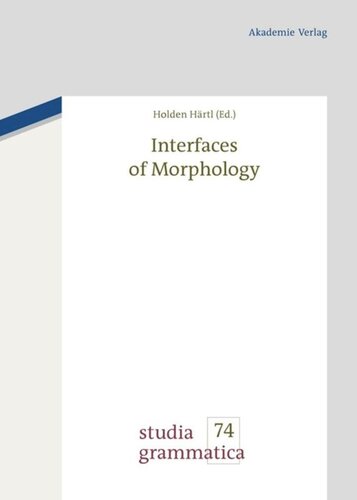

Most ebook files are in PDF format, so you can easily read them using various software such as Foxit Reader or directly on the Google Chrome browser.
Some ebook files are released by publishers in other formats such as .awz, .mobi, .epub, .fb2, etc. You may need to install specific software to read these formats on mobile/PC, such as Calibre.
Please read the tutorial at this link: https://ebookbell.com/faq
We offer FREE conversion to the popular formats you request; however, this may take some time. Therefore, right after payment, please email us, and we will try to provide the service as quickly as possible.
For some exceptional file formats or broken links (if any), please refrain from opening any disputes. Instead, email us first, and we will try to assist within a maximum of 6 hours.
EbookBell Team

4.8
44 reviewsDas morphologische System als eine zentrale Komponente der menschlichen Sprachfähigkeit organisiert eine Reihe strukturbildender Operationen und ist eng mit lexikalischer Produktivität als einer Kerneigen-schaft von Sprache verknüpft. Eine klassische Domäne ist die Wortbildung, die die Erzeugung lexikali-scher Einheiten leistet und damit maßgeblich an der Prägung neuer sprachlicher Konzepte und deren Speicherung beteiligt ist. Heftig diskutiert wird der Status von Morphologie in der Grammatik. Einen Kernpunkt bildet dabei die Frage nach der Autonomie morphologischer Prozesse und vor allem, ob Wortbildungsmechanismen nicht syntaktischen oder semantisch-konzeptuellen Ebenen des Sprachsystems zuzuschlagen sind. Ist es sinnvoll, von einem separaten morphologischen System auszugehen, angesichts dessen, dass viele Me-chanismen, die man traditionell der Morphologie zurechnet, systematisch Pendants in anderen Kompo-nenten des Sprachsystems aufweisen, etwa in der Syntax oder der Phonologie? Diese Fragen bilden den Hintergrund für den vorliegenden Band, der eine Lücke in der Forschung zum Thema füllt, indem er unterschiedliche, an morphologische Bereiche angelagerte Untersuchungen zu-sammenführt. Im Vordergrund stehen dabei Ansätze, welche die Wechselbeziehungen unterschiedlicher grammatischer und nicht-sprachlicher Informationen im Allgemeinen und solche bei der Bildung oder Modifikation von Wörtern und lexikalischen Einheiten im Speziellen thematisieren. Aus einem breit gefä-cherten disziplinären Spektrum werden morpho-syntaktische, semantische, phonologische und textliche Aspekte beleuchtet, um so unter Berücksichtigung ganz unterschiedlicher Gesichtspunkte aus den ver-schiedenen Bereichen der systemtheoretischen und kognitionswissenschaftlichen Linguistik, Computer-linguistik und Literaturwissenschaft zur Erforschung der Grundlage lexikalischer Kreativität und Flexibilität beizutragen. The morphological system as a core component of the language faculty organizes a number of structure-building operations and constitutes the basis of lexical productivity as a central trait of human language. Here, word-formation represents a classical domain, which decisively participates in the creation and memorization of novel concepts. What is hotly discussed is the status of morphology. The debate centers around questions about the autonomy of morphological processes and, in particular, if word-formation could, in fact, be fused with syntactic or semantic-conceptual levels of the language system. Is it reason-able to postulate a separate morphological system in view of the fact that several mechanisms which are traditionally regarded as morphological are systematically mirrored in other components of the language system such as, e.g., syntax or phonology? Against this background, the current volume fills a critical gap in the research on this topic as it brings together various perspectives on interfacing areas of morphol-ogy. The approaches focus on the interplay between different types of grammatical and non-linguistic information in general as well as on the formation and modification of words and lexical units. Morpho-syntactic, semantic, phonological as well as textual aspects are examined from a broad disciplinary spec-trum in order to contribute to an investigation of lexical creativity and flexibility from perspectives of system-theoretical and cognitive-scientific linguistics as well as computer linguistics and literary science.